- Home
- Nancy Pickard
The Virgin of Small Plains Page 8
The Virgin of Small Plains Read online
Page 8
Mitch was amazed he could even think so clearly.
He knew he was going to have to slow down again, as if his father was a slow learner, which God knew, he usually was not. But this was different. This wasn’t a criminal case in his courtroom concerning people he didn’t know. This was personal. Mitch felt as if he, himself, had nearly gone into shock when he saw it; he knew his own brain had wanted to reject it, so was it any wonder that his father was being obtuse?
With a sigh of resignation, Mitch realized he was going to have to tell the entire truth, condoms and all. There was a bowl of his mother’s favorite buttermints beside him; he took one of the pale yellow candies and popped it in his mouth, buying a little time while he ate and swallowed it.
Then he started talking.
Twenty minutes later, when he had finished doing that, it was his father who seemed to be shivering. Staring at the judge, Mitch caught a glimpse of how his father would look as an old man.
“My God,” his father said, in a near-whisper. “This is true, Mitch?”
“Gospel, Dad.” He forced himself to ask, “What do we do now?”
His father’s head jerked up. In an instant, the temporary aging fled from his face and body, and he was immediately himself again, straight-backed, intimidating, commanding. “I’ll figure that out. You will go to bed, and you won’t do anything until I tell you what it’s going to be.” His voice and face softened just a little. “Try to get some sleep.”
Mitch felt immense relief to know his father had taken the awful burden from him.
He got to his feet, stumbling a little on the bottom edge of the blanket.
Without another word, suddenly far too exhausted to talk anymore, he did what his father had told him to do. When he was leaving the room, his father had a hand on the telephone.
His mother woke him before the sun was up.
When Mitch dragged his eyes open, he didn’t understand what he saw: His mother had two large suitcases open on the floor of his room. She was pulling his belongings out of his dresser drawers, and putting them in the luggage.
“Mom? What are you doing?”
He was tired, with an exhaustion that made his eyes want to sink back into his skull, that made him feel like throwing up.
His vision cleared enough for him to realize she was upset.
“Mom? What’s going on? What’s the matter?”
“Your father’s taking you out of town.” Her voice sounded strange, as if it were clogged with tears or anger. Was she mad at him? What had he done? He heard her say, “Get up and get dressed, and help me pack your things. Take as much as you can. I’ll pack everything else up and send it to you.”
“Send it to me where? I don’t understand. Are you mad at me?”
She finally turned around so he could see her better. His mom was also tall, also imposing in her way, though her way consisted of elegance of fashion and sharpness of tongue. Mitch was honest with himself—he’d never liked his mother very much, and he wasn’t absolutely sure he even loved her. He knew he was supposed to, because didn’t all sons love their mothers? But she wasn’t any fun, she was a little scary, because nobody ever knew who she was going to cut to the quick next, and she was about the least huggable mom there could be. Not like Margie Reynolds, who he loved almost as much as he loved Abby. Not like Verna Shellenberger, who was practically a walking hug. On the other hand, it wasn’t as if he liked his father better. If he could have picked a father, it wouldn’t have been Nathan Shellenberger, though. It would have been Abby’s dad…
His fuzzy brain stopped cold at the words, “Abby’s dad.”
A sickening memory of the previous night came back to him.
Awake now, and filled with foreboding, Mitch looked up at his mother.
“You have to go,” she said, and turned back to emptying his drawers.
“Go where? Why?”
But he got no answer from her, just increasingly peremptory instructions to move, move, move. He tried to hurry, without understanding the reason for the haste. When he stepped outside of his room, he saw his father carrying a suitcase of his own down the hallway. When he saw that, Mitch sensed, with an ever-deepening feeling of sick dread, that all these strange goings-on had something to do with the awful thing he had accidentally seen the night before. He wished—for what would turn out to be the first of a million times in his lifetime—that he had never been at Abby’s house the night before, that he had never sneaked down their stairs, never hidden and watched from the closet.
He could hardly believe they were taking to the roads in such deep snow.
His father put chains on the tires, something Mitch had never seen him do before. The judge seemed as determined as Mitch’s mother was to remove him from home as quickly as they could get him to budge.
Mitch took it as long as he could, until his father drove past the Shellenberger ranch, and then he burst out, “Tell me!”
Without taking his eyes from the road, his father said, “They’re denying what you saw, son. Quentin and Nathan. They claim it never happened the way you said it did. They say she was already beaten when Nathan and Patrick took her in.”
“Dad, no! I saw Quentin use the bat!”
“They say that if you tell that story to anyone, they will point out that she worked for us—”
“She worked for lots of people, Dad!”
The girl, Sarah—whose last name still escaped his memory—had only cleaned for his mother for a few months. He wasn’t even sure how often she had done it. Maybe once a week? That seemed like the usual thing. He was pretty sure she had cleaned other people’s houses on other days. She was older than Mitch, already out of high school, and earning her own money that way because there were probably zero jobs where she came from. He didn’t know what she was earning it for, whether for living or for college, maybe. He didn’t know anything about her family. He knew that all his friends practically swooned every time they caught a glimpse of her. And he knew that he hadn’t paid any attention when she stopped working for his mom. One day there was some other woman doing it, and she wasn’t gorgeous like Sarah had been, that’s all he knew.
“I know she worked for other people,” his father answered him, sounding as deliberate and patient as Mitch had forced himself to be the night before. “Unfortunately, it wasn’t those people who saw what you saw last night. They’ll say that she was young, like you. They’re claiming that everybody knew she had a crush on you—”
“What? She did not—”
He wasn’t sure about that. He remembered her smiles when she had been in their house the times he had come home from school or from football practice. He remembered how his own body had reacted to her body when he saw that smile. He remembered feeling flustered, saying, “Hi,” and then hurrying away again. And he had to admit to himself that a lot of girls supposedly had crushes on him through the years. Shit.
His father was saying, “They will put you under suspicion in her death.”
Mitch was stunned. These were his mother’s and father’s friends they were talking about, these were men whose children were his best friends. This was a man—Quentin Reynolds—whom he had looked forward to having as his father-in-law some day. He had even dreamed that Quentin could be the funny, looser, more likeable dad that his own father could never be. Mitch had thought the men cared about him, the way they cared about Abby and Rex and Patrick. The feeling he had at that moment of stark betrayal carved a dividing line in his heart: before and after.
His father glanced over at him. “They are the sheriff and a doctor, Mitch. It would be your word against theirs.”
“But you’re a judge!”
“And your father, which is why no one will take my word for it, either.”
“They’re your friends!”
His father was silent.
“Why are they doing this, Dad? They know me!”
In a strangely cold tone that made Mitch stare at his father, the judge said, “I
think they are no longer sure that they know you very well, Mitch.”
Mitch laid his head back against the seat, feeling stunned and frozen all over again. Did his own father suspect him of something terrible? Was he believing them, instead of his son?
“Dad? You know I’m telling you the truth, right?”
“We’ll get you out of here,” his father said, “and then we’ll find out the truth.”
“What do you mean, find out?” Mitch was so upset he was yelling. “I told you the truth!”
“Stop yelling. I’m only saying, we don’t know everything yet.”
That was true. God knew, that was true. And yet the way his father had said it…did Mitch only imagine the doubt he thought he heard in his father’s voice and saw in his face? Mitch wondered if this was what a defendant in his father’s courtroom felt like when being accused of something terrible that he hadn’t done. Did somebody like that feel as if his whole world was spinning out of control?
“Where are we going?” he asked, in a dull voice.
“Out of this storm track, first. Then we’re going to Chicago, where we will stay until we have you enrolled in a college far away from here.”
“What?” Mitch stared at his father across the car seat.
He wasn’t going to be graduating with his class, his father told him. He wasn’t going to be going to the University of Kansas with his friends. He was going to be sent where nobody could reach him to accuse him of anything he didn’t do.
A great sadness and hopelessness came over Mitch as he heard these things.
He was too confused to be logical, except to follow one terrible train of thought that struck him harder than anything ever had, even harder than what he had seen. I’ll call Abby from our hotel room, he thought at first. And then he realized that not only could he not call her, but that he might never be able to talk to her again.
When that realization struck Mitch, he lost it completely.
He turned his face to the window, and began to cry.
He did it silently, but his broad shoulders shook, and his father said nothing.
It was Abby’s father who had done the terrible thing. It was Doc who was betraying him. It was Rex’s dad who was doing it, too. Mitch couldn’t tell his best friends what their fathers had done without having that horror hanging between them for the rest of their lives. And no matter how much Abby and Rex cared about him, who were they going to believe? Were they going to believe him, or their own fathers, whom they had never had any reason to doubt? Would anybody, even Mitch’s own parents, ever believe him over the word of those two men? With a feeling of utter hopelessness, Mitch thought he knew the answer to that one: No.
I’m never going to marry Abby…
How could she ever choose between him and her own father? How could he ever marry into a family about which he knew such a terrible thing? Her father would never let him back in. Which didn’t matter, because he would never trust Quentin Reynolds again.
It was at that moment that Mitch realized he was never coming home.
“Dad,” he said, after a few miles had passed. “Maybe they killed her. Or…Patrick was there. Maybe Patrick killed her and they’re covering up for him. Maybe she wasn’t really dead when they brought her in. Maybe Doc killed her when he hit her.”
“Mitch! They wouldn’t have done something like that!”
“Right. They’d accuse me of it, but they’re such nice guys, they’d never—”
“Be quiet, Mitch.”
“What happened to her, Dad?”
“I don’t know.”
Later, after still more miles, Mitch said, “What are they covering up?”
His father shot him a glance. “You’re going to have to forget about it.”
“Forget!” He was young, he was overwhelmed by events, he was confused, he was frightened, he was in despair, but he was clear about one thing. Forget? He would never forget, and he would never, ever forgive.
In his second semester at Grinnell College in Iowa, after he hadn’t gone home for Thanksgiving, hadn’t gone home for Christmas, hadn’t gone home at the semester break, he got a letter from his mother that led him to understand that she and his father had not broken off their friendships with the Reynolds and Shellenbergers.
Life in Small Plains was continuing as before, but without him.
Such bitterness began to grow in Mitch that he stopped writing to her, refused his parents’ calls, took only their continuing checks for as long as they were willing to pay them. For most of his undergraduate years, he was more lonely and bitter than he had ever dreamed it was possible to be.
When his mother sent him photographs of the baby boy they had adopted—“Jeffrey Allen,” she wrote—he knew whom they had chosen to believe. He didn’t know exactly what they thought he had done, but he knew he had been replaced, as if he had never lived in their house as their son, as if he had never been.
Chapter Ten
May 31, 2004
On the Memorial Day after Nadine Newquist died, Verna Shellenberger went out early to visit the Virgin’s grave.
Nadine had been dead four months by then, but that wasn’t what drew Rex’s mother to the cemetery. At that hour of the morning, just before 6:00 A.M., mist lay on the prairie like a beautiful, graceful, dangerous gift that the chilly night had left behind for the morning. In the low places, the mist thickened to fog that swirled in her headlights like smoke from the pipes of a Pawnee ghost. Or Shawnee. Or Potawatomi. Verna could never remember which tribes had roamed these hunting grounds. Over the years of their childhood, her boys had collected a couple dozen arrowheads from high points in pastures, where warriors had lost them. But history wasn’t Verna’s strong suit, as she was the first to confess when watching the television show, Jeopardy! Her subjects were cooking, cleaning, raising boys, and putting up with husbands. Or, rather, husband. “I majored in family,” she liked to say when she felt inferior for her lack of a college degree. “You don’t need a fancy degree to get dinner on the table every night for forty years.”
Privately, she wished she had somehow managed to take a few college courses.
Just because she didn’t know any history didn’t mean she couldn’t learn it, she thought.
Or repeat it, she also thought, with a kind of gloomy optimism.
She had to drive with great care to remain safely on her side of the highway, which only added to her rising anxiety. It was worry that had pulled her out of a restless sleep and put her in her car so early in the morning.
There were long stretches where her headlights blinded her in the fog, and it was only the presence of the yellow line that pulled her along to the cemetery. She prayed no crazy rancher was trying to cross the highway with his cows in this weather. She’d known a few that crazy, but most of them had gone out of business—or died—by now. Still, cows and the men who herded them were unpredictable. She knew something about that, too, if she did say so. If a cowboy on a horse suddenly loomed in front of her in the fog, she wouldn’t be surprised. She’d be horrified, because she’d be bound to hit them with her van, but not all that surprised.
With a feeling of relief for having survived the ride, Verna eventually pulled through the cemetery gate.
Normally, she would never have come on a Memorial Day when half the county would show up with their bouquets of real or plastic flowers. Verna lived close enough so that if she wanted to visit graves, she could drop by anytime. It was only because she was feeling desperate that she was here on this day, out of all the days in the year. She had come early, for privacy, and hoped nobody saw her.
Verna threaded her car halfway up the road that led to the top of the hill. There, she pulled over to the side, parked, and got out. She felt a little shaky and out of breath, and had to pause a moment, with her hand on the side of the car, to steady herself before going on.
If she were a kid, she thought, as she started walking onto the grass, she’d feel spooked at being in a cemetery in
a fog like this, where she couldn’t see three rows of tombstones ahead of her. But she figured she was too old to be scared by mere death. She had seen too much of it, between the animals and the friends.
The grass smelled newly mown; the air was damp against her skin.
Verna paused by a neat gravestone to say hello to one of them, her old friend Margie Reynolds.
“Hi, Margie.” She cleared her throat and folded her hands together at her waist. “You’ll be pleased to hear that Ellen is doing her usual great job as mayor. That girl is going to be governor some day, I swear. Quentin’s okay, I guess, but we hardly see him anymore. He seems to keep busy with his medicine, and not much else, as far as I can tell. I wish I could tell you that Abby has fallen sensibly in love with my Rex, and that they are going to get married, and that they’re planning to have grandbabies for you and me, but you’d never believe me, if I tried to put that one over on you.” Verna sighed. Neither of her sons, not Patrick nor Rex, had married yet. “By the time I get grandchildren, Margie, I’ll be so old they’ll think I’m already dead.” She purposely avoided telling her late friend about certain recent activities between her older son and Margie’s younger daughter, not wishing Margie to roll uncomfortably in her grave.
“Have you seen Nadine yet?” she inquired. “You know she’s here, right?”
Verna looked around, aware that she’d sound like a nut to anybody who heard her.
If the fog had ears, or there was anybody over the hill, she couldn’t see them.
“Well, I’ll see you later, honey,” she told Margie Reynolds. She started to walk away, but then turned back, and said, in a voice that suddenly trembled, “I still miss you. You oughtn’t to have gone so soon.”
Ellen and Abby’s mom had been only fifty-eight when the cancer took her.
Next, Verna paid her respects to the more recently buried Nadine Newquist.
“I hope you’re back in your right mind again, Nadine,” she said, rather more sharply than she had intended to speak. She told herself it was only because she was trying to pull herself together and get the shakiness out of her voice. “I’m glad you’re out of your suffering, but I’m sorry you had to go that way.” Reluctantly, she dredged up an insincere sentiment, just so she wouldn’t hurt anybody’s feelings. “I miss you, too.” Like hell, she thought, giving up all pretense of feeling the same about Nadine as she had felt about Margie. It was almost shocking what a relief it was not to have to endure Nadine’s barbed wit anymore. If anybody in the world missed that, then Verna was a monkey’s uncle. “Tom seemed kind of lost for a while without you,” she lied. The judge seemed like a man with a heavy burden lifted, as did many relatives of Alzheimer’s victims after their loved ones died. She and Nathan had Tom over for dinner once a week, and it was good to hear the big man laugh again.

 The Scent of Rain and Lightning
The Scent of Rain and Lightning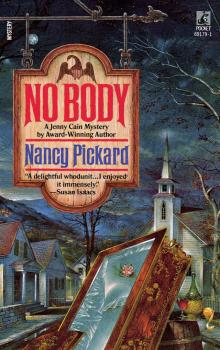 No Body
No Body The Secret Ingredient Murders: A Eugenia Potter Mystery
The Secret Ingredient Murders: A Eugenia Potter Mystery The 27-Ingredient Chili Con Carne Murders: A Eugenia Potter Mystery
The 27-Ingredient Chili Con Carne Murders: A Eugenia Potter Mystery Twilight
Twilight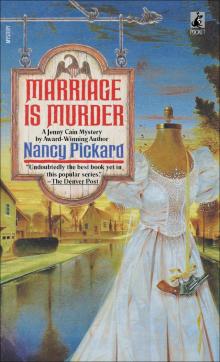 Marriage Is Murder
Marriage Is Murder I.O.U
I.O.U The Virgin of Small Plains
The Virgin of Small Plains Generous Death
Generous Death The Whole Truth
The Whole Truth The Blue Corn Murders
The Blue Corn Murders Say No to Murder
Say No to Murder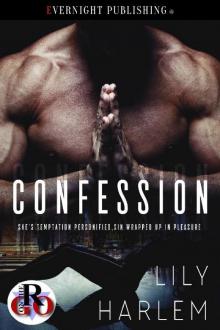 Confession
Confession Dead Crazy
Dead Crazy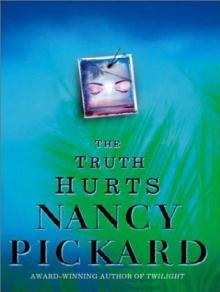 The Truth Hurts
The Truth Hurts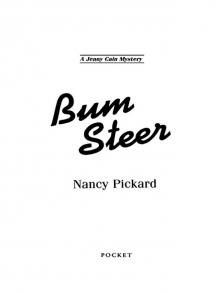 Bum Steer
Bum Steer